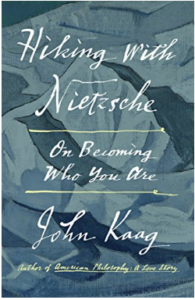 A Fleeting Moment Where Becoming Takes Place
A Fleeting Moment Where Becoming Takes Place
A couple of sentences set the context for this captivating book. “‘Become what you are’: has been described as ‘the most haunting of Nietzsche’s haunting aphorisms.’”
“As it turns out, to ‘become who you are’ is not about finding a ‘who’ you have always been looking for. It is not about separating ‘you’ off from everything else. And it is not about existing as you truly ‘are’ for all time. The self does not lie passively in wait for us to discover it.”
Curious, introspective, courageous, and intelligent are words I would use to describe the intended audience for this book. And those who have encountered suffering on their journey will benefit the most.
The two biggest lessons/benefits the reader will gain is:
1) “Nietzsche’s point may be that the process of self-discovery requires an undoing of the self-knowledge that you assume you already have. Becoming is the ongoing process of losing and finding yourself.”
2) “Modern life, however, is not entirely amenable to becoming who one is; it is designed to distract and deaden…”
The writer, David Haag provides a very transparent example of these statements: “I remember too vividly an argument with my ex-wife that terminated with three words that I screamed before slamming our front door: ‘Let. Me. Be!’ I now know what I actually meant: ‘Get out of my way.’ Let me find my immutable essence. Unfortunately, there is no such thing as an immutable essence, at least not in my world. And so I left, but I never found what I was looking for, not even with (my new family) Carol and Becca. I found something else.”
As a fellow walker, hiker, mountain climber and would-be philosopher, I was enthralled by the writing style the author uses throughout the book weaving his personal pilgrimage in and out of Nietzsche’s stomping grounds high in the Swiss Alps to discuss the thoughts expressed in pivotal books written by this genius who called himself Zarathustra and Dionysus.
The book was a good length—although I must admit—I wanted more. The author stays relentlessly on topic and his writing style is honest and engaging. He writes from personal experience and years of research.
It was a bit unusual that he and his wife (also a philosophy teacher) ) took their young daughter on this pilgrimage of outdoor adventure, but Haag skillfully weaves in lessons gained from the child that redeemed the oddity.
The book reminds me a bit of Sarah Bakewell’s masterful “At the Existentialist Cafe” in that it renders difficult philosophical ideals more accessible by utilizing real-world situations.
The unique aspect of staying in Nietzsche’s spartan haunts and hiking his mountain trails to better understand and explain this tormented man’s insights was brilliant. It is one of those rare books where one discovers a eureka moment on almost every page. I could not put it down.
Nietzsche sums this book up best for me: “It is an excellent thing to express a thing consecutively in two ways, and thus provide it with a right and a left foot. Truth can stand indeed on one leg, but with two she will walk and complete her journey.” (The Wanderer and His Shadow, 1880)